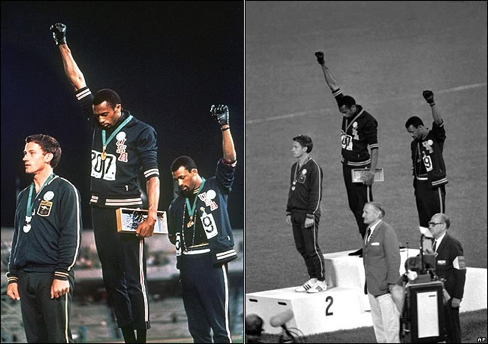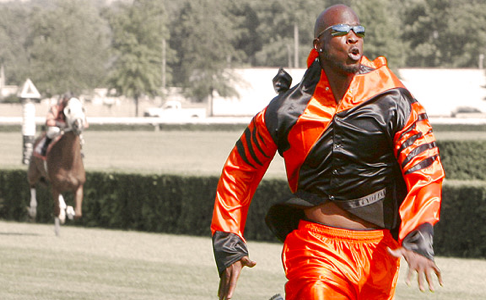As the Super Bowl and Olympics near, Bigotry Flares
Friday, February 7th, the Sochi Olympics kick off under the watch of human rights advocates upset with the Putin administration’s homophobic policies. Five days prior the Seattle Seahawks face off against the Denver Broncos in Super Bowl XLVIII under the watch of 111 million projected viewers. Seahawks cornerback Richard Sherman was recently fined $7,875 by the National Football Conference for taunting his opponents while detractors labeled him a braggart and “thug.” Sherman responded that the word thug is an accepted way of calling someone the n-word, but thug actually comes from Sanskrit’s sthagati which means to cover or conceal. Concealed in the word race is a history of sports much older than football or fines, when hatred was not seen as separate but as part of the package.
The word race comes from the Lombardic raiza which means line, and from the ability to draw lines, we have the ability to judge races; when delineating speed and scale becomes sport, we have racing and when lines dissolve it is impossible to tell who is who which is why racists are always the best referees.
Racism is bias toward speed. It can be found at the Olympics, Nascar, track meets, and soccer matches. It has been found on land, sea, in the air and on ice. It is loudest in stands, bleachers, and couches but has worn its own spikes, Speedos and Velcro-tear sweats. Racism has served emperors who’ve made slaves battle lions the same as college presidents making bank as their athletes make nada. Racism dates back before days when time was tracked in points and skulls.
Fig. 01 Fists felt round the world.
At the 1968 Summer Olympics, Tommie Smith won the 200 meter-dash in 19.83 seconds and, in a show of black unity, punched the air so slowly and for so long that the International Olympic Committee suspended him and collaborator John Carlos from the U.S. track team and the Olympic Village. The act was one of many demonstrations dancing across that year and its neighbors, a time when psychedelics and war were thought to be passing andsomething called ecstasy began morphing toward molly. Clarity shows no stronger when historians and even the most imperial fascists make mention of Adolf Hitler, a racist par excellence, who compelled his people toward punctual motions and extreme economy. Hitler himself was welcomed by the IOC only decades prior with an entire salutation system based on strike-only waiving.
Fig. 02 Traveling at the speed of Ochocinco.
In 2007, when wide receiver Chad Johnson raced an Iberian sulphur horse, many expressed fears of an older style of racism coming afield, one that compared races and species. To squash their fears, Johnson, who won, changed his name to Ochocinco, a Spanish corruption for the numbers assigned his NFL jersey. Progressive sports fans often petition teams like the Bengals and Dolphins to change their names for insensitivity to extinction. Conversely, the Braves, an MLB team, are consistently applauded for their celebration of bravery on both sides. The ability to corrupt other cultures in the style of Ochocinco is the first step toward speaking the language of defeat which, on the whole, is a subversion of racism. Those we defeat rarely seem racist because racists, by nature, excel and achieve whereas those shown defeated are often its victims.
Across the world many metropolises remediate language toward a pidgin called fluency. Some believe speaking snippets of all dictions poorly is the best way to project un-bias. However, silent remediation has its clout too—for, the less one speaks, the less one gets in and, the less one gets in, the less a line can be crossed. No race is won without crossing a line and, when no one loses, our biases founder.
Fig. 03 Barkley left; Ming Yòubiān.
One way of practicing silent remediation occurs during speed reading which ensures minimal delineation of characters, plot, settings and symbols; speed reading makes it difficult to tell who is who and who has done what at what time and where. Speed readers should not be confused with sports announcers who speed talk among the best of the biased. Charles Barkley, while announcing, once commended Chinese center Yao Ming for dunking on black people so slowly he hadn’t yet done it. Barkley’s quick wit won him a fine. In short, the best speed readers lose all track of names and are vaguest at speaking when speaking at all. While not an officially recognized sport, speed reading has taken great hold on buses, subways, school desks and cell phones, so much that future generations will exist without race.
Fig. 04 Skins vs. Skins.
Whether one-on-one or in teams, sports inspire camaraderie amongst their fans and that camaraderie spawns its own rules, regulations, rituals and tribes. Racism itself has been called a team sport and is the last defense against reading alone.
Josh Milberg was born in Miami, Florida on October 10th, 1984. He serves as Director of Promotions and Outreach for Electric Literature and writes the Televised Atlas series for Nowhere (online). He dedicates this piece to Vi Khi Nao for “The Negroidian Zero” which can be found in NOON 2011.





